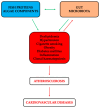Effects of Marine-Derived Components on Cardiovascular Disease Risk Factors and Gut Microbiota Diversity
- PMID: 39590803
- PMCID: PMC11595733
- DOI: 10.3390/md22110523
Effects of Marine-Derived Components on Cardiovascular Disease Risk Factors and Gut Microbiota Diversity
Abstract
Cardiovascular diseases (CVDs), which comprise coronary heart disease, hypertension, and stroke, collectively represent the number one cause of death globally. Atherosclerosis is the dominant cause of CVDs, and its risk factors are elevated levels of low-density lipoprotein cholesterol and triglycerides, hypertension, cigarette smoking, obesity, and diabetes mellitus. In addition, diverse evidence highlights the role played by inflammation and clonal haematopoiesis, eventually leading to immunity involvement. The human microbiota project and subsequent studies using next-generation sequencing technology have indicated that thousands of different microbial species are present in the human gut. Disturbances in the gut microbiota (GM) composition, i.e., gut dysbiosis, have been associated with diseases ranging from localised gastrointestinal disorders to metabolic and cardiovascular illnesses. Of note, experimental studies suggested that GM, host immune cells, and marine-derived ingredients work together to ensure intestinal wall integrity. This review discusses current evidence concerning the links among GM, marine-derived ingredients, and human inflammatory disease. In detail, we summarise the impact of fish-derived proteins/peptides and algae components on CVD risk factors and gut microbiome. Furthermore, we describe the interplay among these dietary components, probiotics/prebiotics, and CVDs.
Keywords: atherosclerosis risk factors; cardiovascular diseases; fish protein hydrolysates; marine-derived ingredients; microbiota; probiotics; seaweeds.
Conflict of interest statement
The authors declare no conflicts of interest.
Figures


Similar articles
-
Potential Benefits of Probiotics and Prebiotics for Coronary Heart Disease and Stroke.Nutrients. 2021 Aug 21;13(8):2878. doi: 10.3390/nu13082878. Nutrients. 2021. PMID: 34445037 Free PMC article. Review.
-
The gut microbiota as a novel regulator of cardiovascular function and disease.J Nutr Biochem. 2018 Jun;56:1-15. doi: 10.1016/j.jnutbio.2017.12.010. Epub 2017 Dec 27. J Nutr Biochem. 2018. PMID: 29427903 Review.
-
Bridging the Gap between Gut Microbial Dysbiosis and Cardiovascular Diseases.Nutrients. 2017 Aug 10;9(8):859. doi: 10.3390/nu9080859. Nutrients. 2017. PMID: 28796176 Free PMC article. Review.
-
Effects of Fish n-3 PUFAs on Intestinal Microbiota and Immune System.Mar Drugs. 2019 Jun 22;17(6):374. doi: 10.3390/md17060374. Mar Drugs. 2019. PMID: 31234533 Free PMC article. Review.
-
Probiotics, gut microbiome, and cardiovascular diseases: An update.Transpl Immunol. 2024 Apr;83:102000. doi: 10.1016/j.trim.2024.102000. Epub 2024 Jan 21. Transpl Immunol. 2024. PMID: 38262540 Review.
Cited by
-
Gut Microbiota and Cardiovascular Diseases: Unraveling the Role of Dysbiosis and Microbial Metabolites.Int J Mol Sci. 2025 Apr 30;26(9):4264. doi: 10.3390/ijms26094264. Int J Mol Sci. 2025. PMID: 40362500 Free PMC article. Review.
-
Macronutrients as Regulators of Intestinal Epithelial Permeability: Where Do We Stand?Compr Rev Food Sci Food Saf. 2025 May;24(3):e70178. doi: 10.1111/1541-4337.70178. Compr Rev Food Sci Food Saf. 2025. PMID: 40421830 Free PMC article. Review.
References
-
- Benjamin E.J., Blaha M.J., Chiuve S.E., Cushman M., Das S.R., Deo R., de Ferranti S.D., Floyd J., Fornage M., Gillespie C., et al. Heart Disease and Stroke Statistics-2017 Update: A Report from the American Heart Association. Circulation. 2017;135:e146–e603. doi: 10.1161/CIR.0000000000000485. - DOI - PMC - PubMed
Publication types
MeSH terms
Substances
Grants and funding
- 0/Progetto Eccellenza
- 0/BANDO DI ATENEO PROGETTI "PROBLEM-DRIVEN"- PROGETTO FONZIE (D.R.1116/2022 prot.202389
- B83C22003920001/European Union - Next Generation EU, in the context of The National Recovery and Resilience Plan, Investment 1.5 Ecosystems of Innovation, Project Tuscany Health Ecosystem (THE

